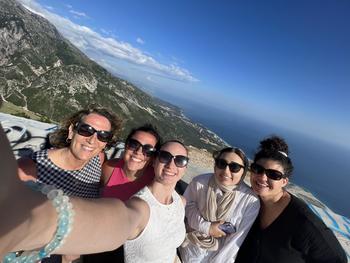This summer, College of Public Health students participated in a study abroad to Albania to observe and learn from the country’s public health and medical systems. While in Tirana, the capital of Albania, students participated in both structured lectures as well as experiential learning activities alongside local Albanian students. While the central topic was environmental and occupational health, course topics also included foundations in global public health education, chronic and infectious disease epidemiology, and international relations for strengthening global public health.

As opposed to learning from outside sources, students heard from local scholars, public health practitioners and professionals about what it means to strengthen public health infrastructure.
Magdaline Anderson, a trip participant and current Master of Public Health student concentrating in Nutrition and Food Security, gained insights she otherwise would not have if not for this trip and is sure this experiential trip will make her a more well-rounded public health practitioner.
“Immersing oneself in a new location and culture is an experience that goes beyond the confines of a classroom or reading materials. During this trip, I had the privilege of gaining a fresh perspective on public health,” Anderson said.
The trip, which lasted 14 days, was guided by Melissa J. Perry, Dean of the College of Public Health.
As an internationally acclaimed epidemiologist, Dean Perry’s expertise in occupational and environmental epidemiology served to provide students on the trip with a unique opportunity to engage with the Albanian public health system through both discussion-based and experiential learning.
“Understanding diverse public health systems informs how we can improve health care here in the United States and throughout the world,” said Dean Perry. “This trip facilitated the growth and development of future public health leaders through exposure to a wide variety of topics and provided inspiration for innovative solutions to domestic and global health challenges.”
Amber Mahmood, another student attendee, observed that middle-income countries share similarities with both high and low-income nations. She learned how greater productivity is driven by healthier workers and why forging connections is key to systematic change. By the end of the trip, Mahmood gained new understanding of why prevention should always be the priority in health and that while intervention methods can vary, models of prevention should always maintain a strong framework and should be flexible enough to adjust to a population’s specific needs including the importance of culture.
Jessica Pope Mitro, an assistant professor in the Department of Global and Community Health, was also present on the study abroad as a faculty instructor.
“In traditional classroom settings, historical aspects are often given limited attention. However, through discussions with Dr. Mitro and Dean Perry, we explored the past and how it continues to influence the lives of those residing there today. This comprehensive understanding of a location's history, and its ongoing impact, is something I believe is truly unique to immersive experiences like this one,” said Anderson.
The study abroad offered opportunities to engage with colleagues and partners closely involved in Albania’s public health sector. Students attended presentations from and participated in discussion with Albanian University representatives and the Albanian Institute of Public Health, as well as a lecture from the Albanian Minister of Health.
While on the trip, students also attended the International Conference of Occupational and Environmental Health Advances hosted by Collegium Ramazzini, an international academic academy dedicated to advancing occupational and environmental public health. Prominent experts from across the globe presented the latest findings and led discussions on environmental and occupational risks for cancer, preventing infectious disease spread in workplaces, and increasing health care worker safety. Students were also afforded the opportunity to network with Collegium Ramazzini Members and gain professional development.

“Learning from Dean Perry and other international public health experts was an incredible opportunity for me, and I am incredibly lucky to have had the chance to learn from them. I am so grateful to have had that opportunity to hear about the experiences they have had,” said Mahmood.
In addition to learning about the Albanian public health system, students were able to experience local tourist attractions, including the Albanian National Museum and Mount Dajti National Park to take in the scenic parts of Tirana.
More Study Abroad Stories
- August 26, 2024
- October 9, 2023
- August 9, 2022
- April 26, 2022
